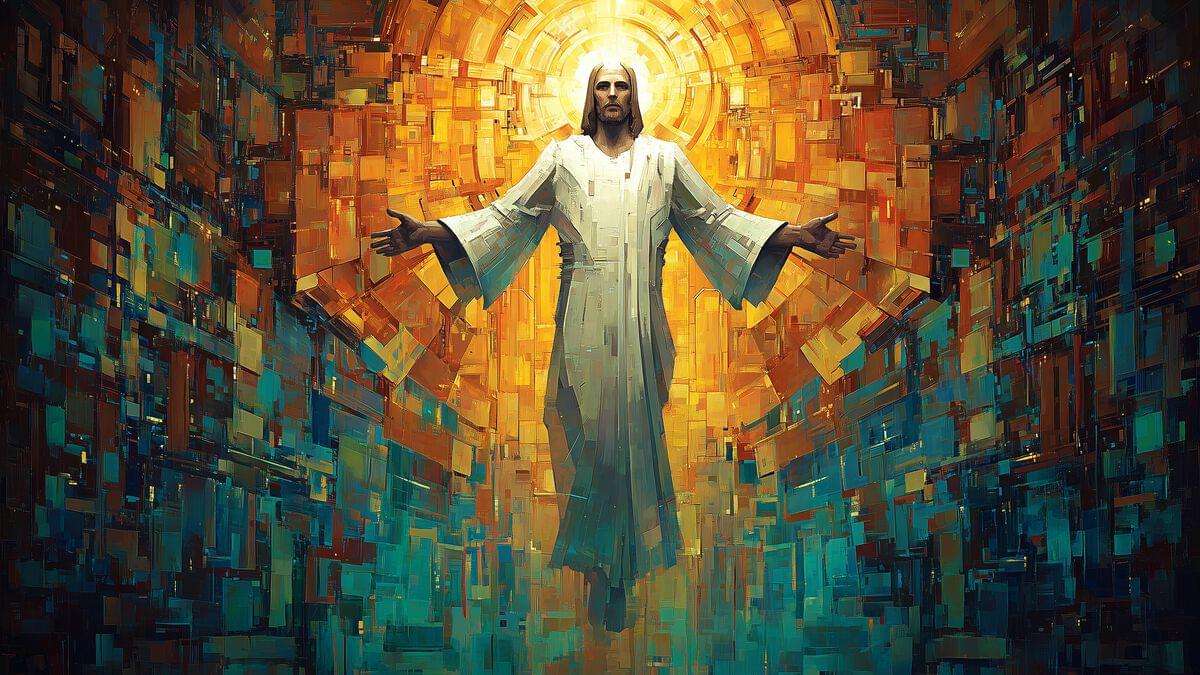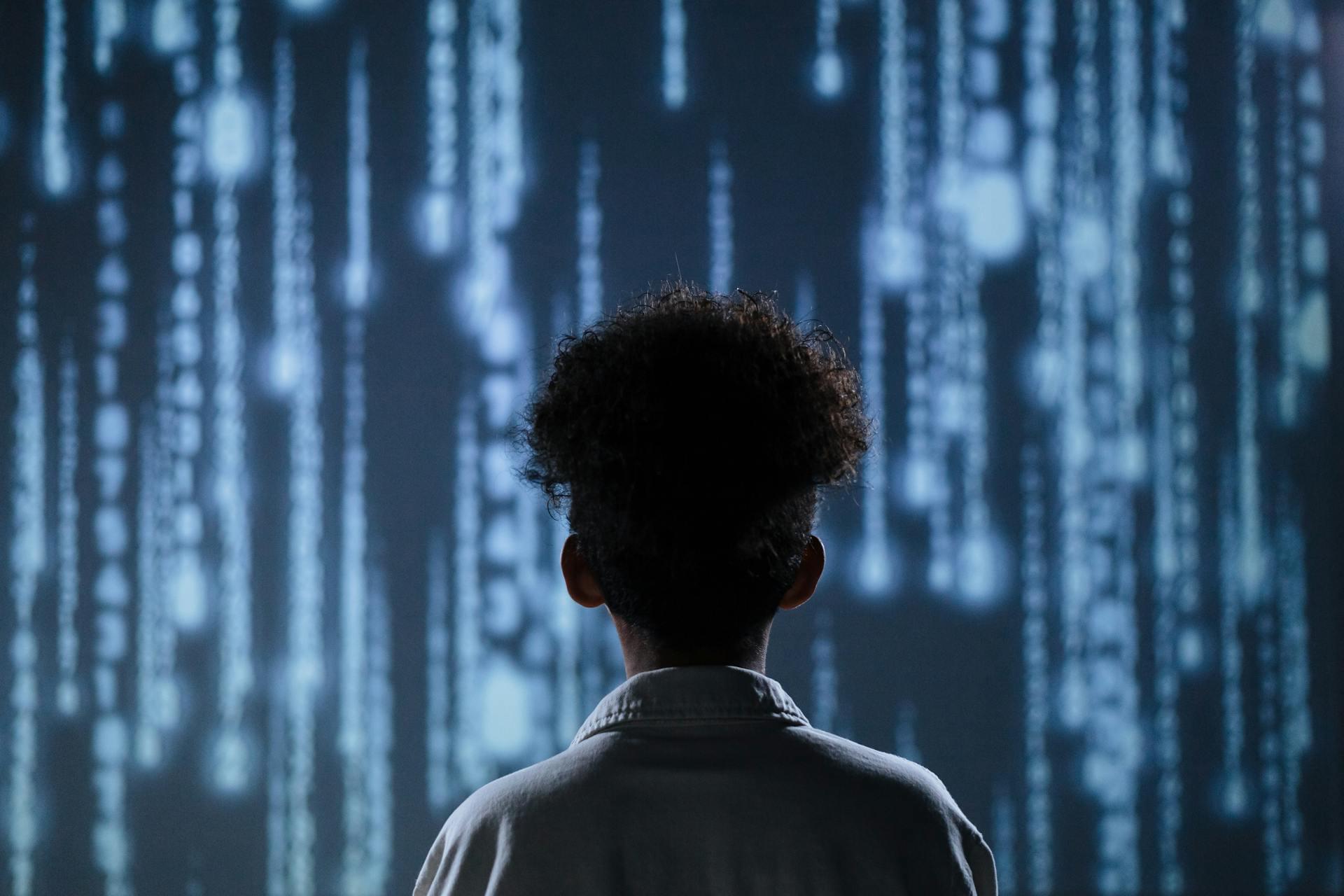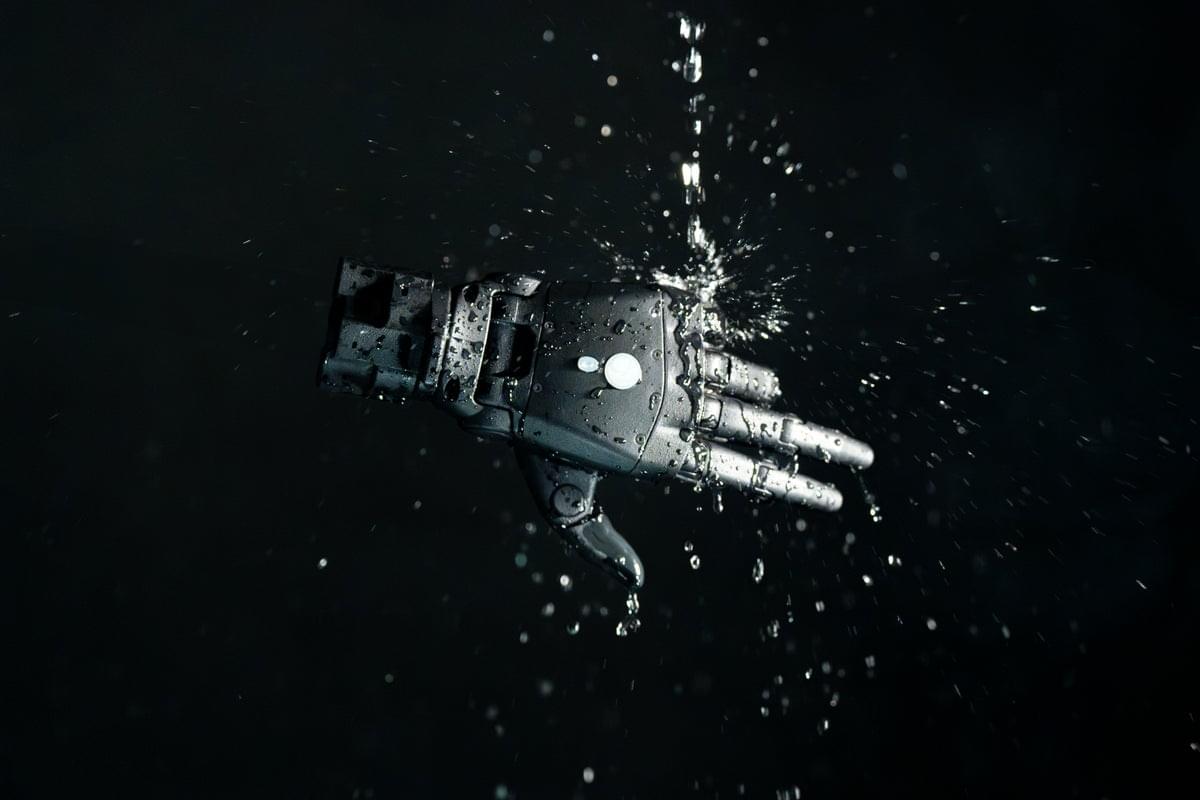By popular request we’ve begun adding playlists of the show as Podcasts on Youtube Music, I’ll try to add a new one every 2–3 days till we have most of our inventory up there, but given today’s Episode is *Cities of the Future*, a collection of all of those seemed a good idea https://www.youtube.com/playlist?list=PLIIOUpOge0LuyCbYUhy-79RQKkOXonmx4 These are the (tentatively named) upcoming playlists/podcasts list I’ll be adding, in no particular order: Megastructures & Extreme Engineering The Fermi Paradox & Alien Civilizations Space Colonization & Habitats Post-Scarcity & Future Civilizations Transhumanism & Human Evolution Propulsion & Interstellar Travel Terraforming & Planetary Engineering Mind, Machines & Alien Intelligence Future Warfare & Defense Strange Worlds & Alien Life.
Category: transhumanism – Page 2
A man without a hand… now feels warmth, pressure, even pain through metal!
Bionic limbs, bionic arms, bionic legs, prosthetic limbs, prosthetic arms, prosthetic legs, artificial limbs, artificial arms, artificial legs, robotic limbs, robotic arms, robotic legs, advanced prosthetics, advanced bionics, neural prosthetics, neural interfaces, brain-computer interface, brain-machine interface, sensory feedback prosthetics, touch-sensitive prosthetics, feeling prosthetics, prosthetics with sensation, prosthetics with touch, prosthetics with feeling, prosthetics with feedback, prosthetics with sensors, prosthetics with AI, prosthetics with machine learning, prosthetics with robotics, prosthetics with neural networks, prosthetics with brain control, prosthetics with mind control, prosthetics with thought control, prosthetics with nerve control, prosthetics with muscle control, prosthetics with EMG, prosthetics with EEG, prosthetics with TMR, prosthetics with osseointegration, prosthetics with myoelectric control, prosthetics with pattern recognition, prosthetics with haptics, prosthetics with vibration feedback, prosthetics with pressure sensors, prosthetics with temperature sensors, prosthetics with force sensors, prosthetics with motion sensors, prosthetics with position sensors, prosthetics with tactile sensors, prosthetics with kinesthetic feedback, prosthetics with proprioception, prosthetics with sensory substitution, prosthetics with sensory augmentation, prosthetics with sensory restoration, prosthetics with sensory integration, prosthetics with sensory encoding, prosthetics with sensory decoding, prosthetics with sensory stimulation, prosthetics with sensory perception, prosthetics with sensory experience, prosthetics with sensory illusion, prosthetics with sensory reality, prosthetics with sensory feedback loop, prosthetics with sensory feedback system, prosthetics with sensory feedback technology, prosthetics with sensory feedback device, prosthetics with sensory feedback mechanism, prosthetics with sensory feedback method, bionic limb technology, advanced prosthetic arms, robotic limb advancements, neural-controlled prosthetics, sensory feedback in prosthetics, touch-sensitive bionic limbs, brain-machine interface prosthetics, AI-powered prosthetic limbs, next-gen prosthetics, prosthetics with real sensation, smart prosthetic technology, haptic feedback prosthetics, nerve-integrated bionic limbs, mind-controlled prosthetics, future of prosthetic limbs, prosthetic limbs with touch, innovative prosthetic designs, cutting-edge bionic arms, prosthetics with sensory input, advanced limb replacement, intelligent prosthetic systems, prosthetic limbs with AI, sensory-enabled prosthetics, high-tech prosthetic limbs, prosthetics with neural feedback, robotic prosthetics with touch, advanced bionic limb systems, prosthetic limbs with real feel, smart bionic limb technology, prosthetics with brain interface, next-generation prosthetic limbs, prosthetics with sensory technology, AI-integrated prosthetic limbs, prosthetics with real-time feedback, advanced prosthetic limb control, prosthetics with tactile feedback, intelligent bionic limb systems, prosthetics with sensory integration, prosthetic limbs with neural control, advanced prosthetic limb technology, prosthetics with sensory enhancement, smart prosthetic limb systems, prosthetics with touch feedback, AI-driven prosthetic limbs, prosthetics with real sensation technology, advanced bionic limb control, prosthetics with sensory capabilities, intelligent prosthetic limb technology, prosthetics with tactile sensation, next-gen bionic limb systems, prosthetics with neural integration, smart prosthetic limb control, prosthetics with sensory feedback systems, advanced prosthetic limb designs, prosthetics with touch-sensitive technology, AI-powered bionic limbs, prosthetics with real-time sensory feedback, intelligent bionic limb control, prosthetics with sensory response, advanced prosthetic limb interfaces, prosthetics with tactile response, smart bionic limb control, prosthetics with sensory feedback integration, AI-integrated bionic limbs, prosthetics with real-time touch feedback, advanced prosthetic limb systems, prosthetics with sensory feedback technology, intelligent prosthetic limb systems, prosthetics with tactile feedback integration, next-gen prosthetic limb technology, prosthetics with sensory feedback mechanisms, synthetic limbs with emotion, AI in prosthetic development, robotic arms with brain control, feeling-enabled prosthetic arms, bionic sense of touch, real-time neural prosthetics, prosthetic limbs that feel pain, emotion-sensing bionic limbs, tactile bionic limb feedback, smart limbs with sensory feedback, neuroprosthetics with AI, feeling through robotic hands, human-machine sensory fusion, emotional robotics prosthetics, pain-sensing artificial limbs, robotic prosthetics with emotion, neural feedback robotic limbs, brain-connected prosthetic systems, adaptive robotic prosthetic, future prosthetics with emotions.

Distorting Transhumanism at Meridian Magazine
Meridian Magazine positions itself as a publication for members of The Church of Jesus Christ of Latter-day Saints, the largest Mormon denomination. I don’t know much about Meridian or the people behind it. But today I learned that they’re willing to publish a fear-mongering distortion of Transhumanism, “Human 2.0 Is Here — And You Didn’t Even Notice” by Alexis Tarkaleson. Despite their positioning, I wish to make make clear that such behavior is not aligned with the values that the Church advocates.
Tarkaleson says “mind uploading” is an outlandish tale. What’s her take on tales of transfiguration and resurrection? Are those equally outlandish? Surely she’s aware that those doctrines require the possibility of mind (or spirit body) moving from one physical body to another, consistent with hypotheses of mind uploading.
How about cryonics, yet another outlandish tale she identifies? I’m curious to know what she thinks about the Church’s advocacy to collect genealogy and preserve family history, with intent to facilitate redemption of the dead. And what about proxy rituals that we perform for the dead? Most of the world probably thinks the Church’s practices in these areas are at least as outlandish as those of cryonicists.
Tilly’s bionic hand can crawl around on its own
19-year-old Instagram influencer Tilly Lockey has been at the forefront of prosthetic innovation with UK-base…
The case for open decentralized beneficial general intelligence, with Ben Goertzel
We live at a time when humanity has never experienced such a rapid pace of change. We’re in the midst of unprecedented technological change, cultural change, political change, and philosophical change.
Some observers predict that the pace of change will slow down, but others anticipate that it will in fact increase — largely due to artificial intelligence leaping forward in capability, to the point where it exceeds human cognitive capabilities in every dimension.
How credible is such a possibility? How should humanity prepare for it? What values should guide us in our reactions and proactions to various new opportunities and potential threats that seem to be emerging almost daily?
The guest in this London Futurists webinar, Ben Goertzel, has arguably thought longer, harder, more creatively, and more boldly, about these questions, than anyone else on the planet. But he’s not just a thinker; Ben is very much also a doer — an organiser, an entrepreneur, an architect, an engineer, and a leader of too many initiatives to mention them all individually.
But let’s briefly highlight:
• Ben’s role as the long-time champion of the concept of AGI, artificial general intelligence;
• his role as the founder and leader of SingularityNET, with its mission to create a decentralized, democratic, inclusive and beneficial AGI;
• his leadership roles at Humanity+, the international transhumanist organisation, where he has served since 2008 as either Vice Chair or Chair;
• and his commitment to the writing and publication of mind-expanding ideas, such as his 2010 book \.
The Rise of Cyborgs: Merging Man with Machine | Terrifying Future of Human Augmentation
Human cyborgs are individuals who integrate advanced technology into their bodies, enhancing their physical or cognitive abilities. This fusion of man and machine blurs the line between science fiction and reality, raising questions about the future of humanity, ethics, and the limits of human potential. From bionic limbs to brain-computer interfaces, cyborg technology is rapidly evolving, pushing us closer to a world where humans and machines become one.
Shocking transformation, futuristic nightmare, beyond human limits, man merges with machine, terrifying reality, future is now, ultimate evolution, secret experiments exposed, technology gone too far, sci-fi turns real, mind-blowing upgrade, science fiction no more, unstoppable machine man, breaking human boundaries, dark future ahead, human cyborgs, cyborg technology, cyborg implants, cyborg augmentation, cyborg evolution, cyborg future, cyborg innovations, cyborg advancements, cyborg ethics, cyborg integration, cyborg society, cyborg culture, cyborg development, cyborg research, cyborg science, cyborg engineering, cyborg design, cyborg applications, cyborg trends, cyborg news, cyborg updates, cyborg breakthroughs, cyborg discoveries, cyborg implants, bionic limbs, neural interfaces, prosthetic enhancements, biohacking, cybernetics, exoskeletons, brain-computer interfaces, robotic prosthetics, augmented humans, wearable technology, artificial organs, human augmentation, smart prosthetics, neuroprosthetics, biomechatronics, implantable devices, synthetic biology, transhumanism, bioengineering, nanotechnology, genetic engineering, bioinformatics, artificial intelligence, machine learning, robotics, automation, virtual reality, augmented reality, mixed reality, haptic feedback, sensory augmentation, cognitive enhancement, biofeedback, neurofeedback, brain mapping, neural networks, deep learning, biotechnology, regenerative medicine, tissue engineering, stem cells, gene therapy, personalized medicine, precision medicine, biomedical engineering, medical devices, health tech, digital health, telemedicine, eHealth, mHealth, health informatics, wearable sensors, fitness trackers, smartwatches, health monitoring, remote monitoring, patient engagement, health apps, health data, electronic health records, health analytics, health AI, medical robotics, surgical robots, rehabilitation robotics, assistive technology, disability tech, inclusive design, universal design, accessibility, adaptive technology, human-machine interaction, human-computer interaction, user experience, user interface, UX design, UI design, interaction design, design thinking, product design, industrial design, innovation, technology trends, future tech, emerging technologies, disruptive technologies, tech startups, tech entrepreneurship, venture capital, startup ecosystem, tech innovation, research and development, R&D, scientific research, science and technology, STEM, engineering, applied sciences, interdisciplinary research, academic research, scholarly articles, peer-reviewed journals, conferences, symposiums, workshops, seminars, webinars, online courses, e-learning, MOOCs, professional development, continuing education, certifications, credentials, skills development, career advancement, job market, employment trends, workforce development, labor market, gig economy, freelancing, remote work, telecommuting, digital nomads, coworking spaces, collaboration tools, project management, productivity tools, time management, work-life balance, mental health, wellness, self-care, mindfulness, meditation, stress management, resilience, personal growth, self-improvement, life coaching, goal setting, motivation, inspiration, success stories, case studies, testimonials, reviews, ratings, recommendations, referrals, networking, professional associations, industry groups, online communities, forums, discussion boards, social media, content creation, blogging, vlogging, podcasting, video production, photography, graphic design, animation, illustration, creative arts, performing arts, visual arts, music, literature, film, television, entertainment, media, journalism, news, reporting, storytelling, narrative, communication, public speaking, presentations, persuasion, negotiation, leadership, management, entrepreneurship, business, marketing, advertising, branding, public relations, sales, customer service, client relations, customer experience, market research, consumer behavior, demographics, psychographics, target audience, niche markets, segmentation, positioning, differentiation, competitive analysis, SWOT analysis, strategic planning, business development, growth strategies, scalability, sustainability, corporate social responsibility, ethics, compliance, governance, risk management, crisis management, change management, organizational behavior, corporate culture, diversity and inclusion, team building, collaboration, innovation management, knowledge management, intellectual property, patents, trademarks, copyrights.


3D printing approach strings together dynamic objects to assemble bionic robots, sculptures and more
It’s difficult to build devices that replicate the fluid, precise motion of humans, but that might change if we could pull a few (literal) strings. At least, that’s the idea behind “cable-driven” mechanisms in which running a string through an object generates streamlined movement across an object’s different parts. Take a robotic finger, for example: You could embed a cable through the palm to the fingertip of this object and then pull it to create a curling motion.
While cable-driven mechanisms can create real-time motion to make an object bend, twist, or fold, they can be complicated and time-consuming to assemble by hand. To automate the process, researchers from MIT’s Computer Science and Artificial Intelligence Laboratory (CSAIL) have developed an all-in-one 3D printing approach called “Xstrings.” Part design tool, part fabrication method, Xstrings can embed all the pieces together and produce a cable-driven device, saving time when assembling bionic robots, creating art installations, or working on dynamic fashion designs.
In a paper to be presented at the 2025 Conference on Human Factors in Computing Systems (CHI2025), the researchers used Xstrings to print a range of colorful and unique objects that included a red walking lizard robot, a purple wall sculpture that can open and close like a peacock’s tail, a white tentacle that curls around items, and a white claw that can ball up into a fist to grab objects.
James Fodor — Exploring the Frontiers of Computational Neuroscience
James Fodor discusses what he is researching, mind uploading etc.
As of 2020, James Fodor, is a student at the Australian National University, in Canberra, Australia. James’ studies at university have been rather diverse, and have at different times included history, politics, economics, philosophy, mathematics, computer science, physics, chemistry, and biology. Eventually he hopes to complete a PhD in the field of computational neuroscience.
James also have a deep interest in philosophy, history, and religion, which he periodically writes about on his blog, which is called The Godless Theist. In addition, James also has interests in and varying levels of involved in skeptical/atheist activism, effective altruism, and transhumanism/emerging technologies. James is a fan of most things sci-fi, including Star Trek, Dr Who, and authors such as Arthur C. Clarke and Isaac Asimov.
Many thanks for watching!
Consider supporting SciFuture by:
a) Subscribing to the SciFuture YouTube channel: http://youtube.com/subscription_center?add_user=TheRationalFuture b) Donating.
- Bitcoin: 1BxusYmpynJsH4i8681aBuw9ZTxbKoUi22
- Ethereum: 0xd46a6e88c4fe179d04464caf42626d0c9cab1c6b.
- Patreon: https://www.patreon.com/scifuture c) Sharing the media SciFuture creates: http://scifuture.org.
Kind regards.